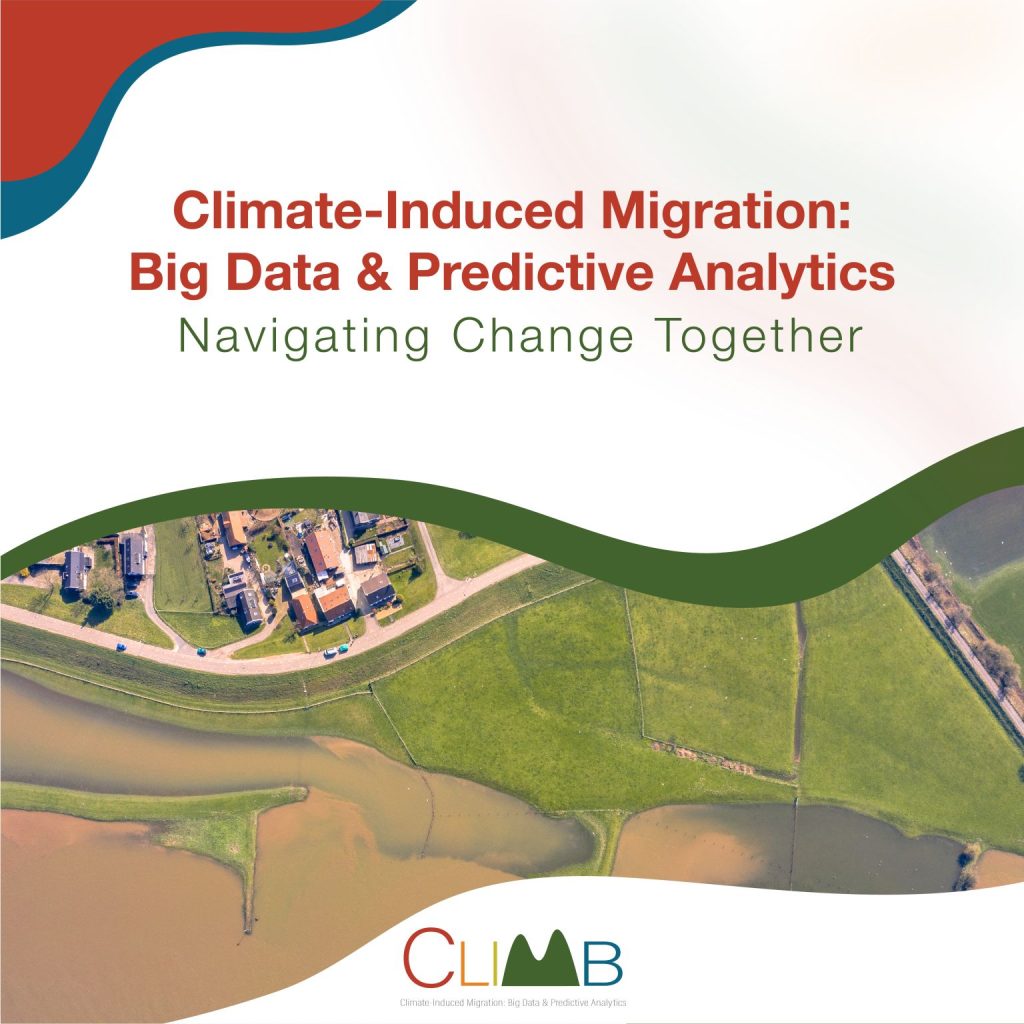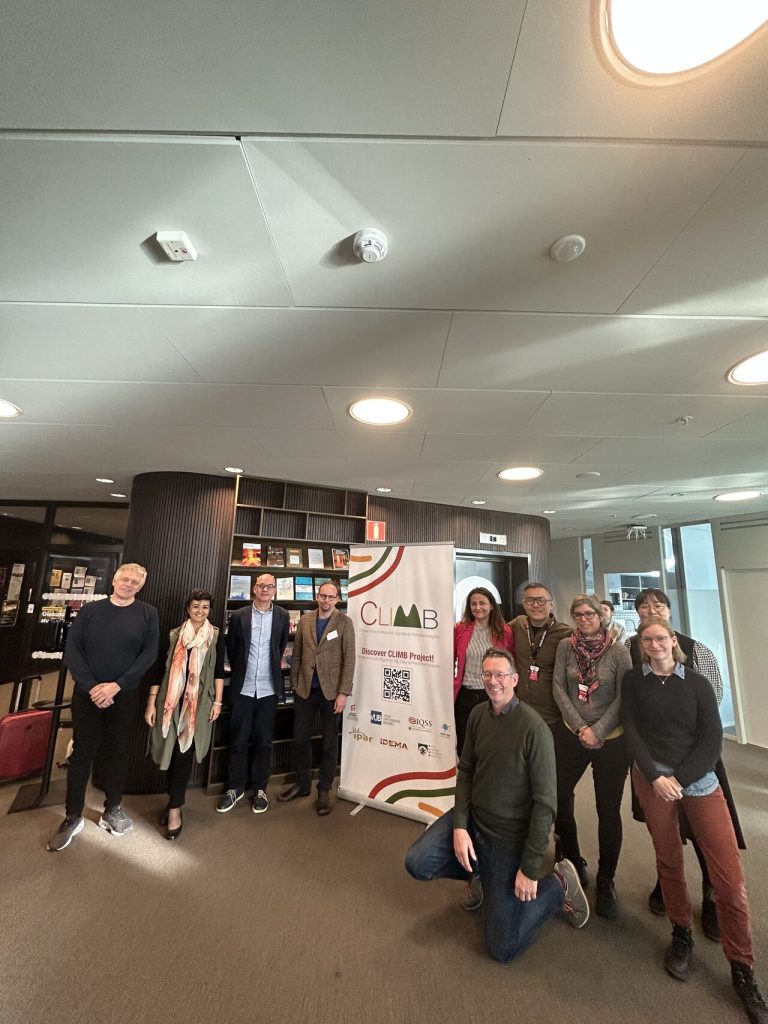CLIMB Project Newsletter #1: Let’s navigate change together!
Welcome to the first issue of the CLIMB Project e-newsletter. The CLIMB Newsletter series is a communication initiative designed to inform, engage, and inspire our stakeholders and subscribers about the latest developments, research findings, and activities related to climate-induced migration and human mobility every three months. Our newsletter themes will offer a diverse range from migration, climate change to big data and analytics.
In the first issue of our newsletter, we chart our route under the following headings.
- Opening Words – Haodong Qi & Tuba Bircan, on behalf of the CLIMB Consortium
- What is CLIMB Project About?
- The Project’s Research Questions
- Who is Our Team?
- How Can You Get Involved?
You can subscribe to our newsletter on http://climbproject.org/subscribe/ page and stay tuned. Let’s get started and navigate change together!
Opening Words
Hurray! CLIMB is six-month-old now. This newbie project seeks to better model and predict Climate-Induced Migration in Africa and Beyond by leveraging Big Data and machine learning. While taking baby steps, our team has harvested some news to share.
On October 16-17, CLIMB’s first international workshop was successfully held at Malmö University. We were honored to host a dynamic and distinguished assembly of 51 participants hailing from prominent institutions and organizations worldwide. This diverse and inclusive gathering fostered enriched discussions and collaborations at the intersection of climate change and human migration. Moreover, CLIMB’s first scientific publication is now out in European Physical Journal: EPJ Data Science, which showcases the use of Big Data and machine learning in the context of international migration.
While excited about embarking on this new journey, we would like to thank everyone who supported our initiative, namely Global Migration Data Analysis Centre (GMDAC), European Commission Joint Research Centre (JRC), Internal Displacement Monitoring Centre (IDMC), Médecins Sans Frontières (MSF), HumMingBird Project, SoBigData++ European laboratory on Big Data Analytics and Social Mining, Save the Children, NeedsMap, ESRI Turkey, Utrecht University, and Swedish Migration Studies Delegation (Delmi). We are also grateful to the partners of the Belmont Forum who provided us with generous financial support (Swedish Research Council, Scientific and Technological Research Council of Türkiye, Swedish International Development Cooperation Agency, Austrian Science Fund, and US National Science Foundation).
Best regards,
Haodong & Tuba
On behalf of the CLIMB Consortium
What is CLIMB Project About?
Climate change (interlinked with humanitarian crises and other economic and health factors) could lead to internal resettlements, international migration, and other (new) forms of human mobility. However, the empirical link between various climatic conditions and migration outcomes is highly contested, and, to date, no unified theoretical approach can adequately capture the complexity and contextual dependency of climate-induced migration. To address this gap, CLIMB seeks to develop a holistic approach which will allow us to better understand the mechanisms and pathways underlying the climate-migration nexus, and to predict temporal-spatial mobility patterns in Africa and beyond. Specifically, we will investigate how climate change may intersect with conflicts, poverty, and epidemics, among other adversities, and how these forces may operate in tandem in driving human migration, with a special focus on Africa.
The Project’s Research Questions

Climate risks are more likely to affect mobility within administrative areas/countries than cross-border migration. As a result, macro analyses of cross-country migration flows tend to find small and very uncertain climate impact on human mobility. Rather than aiming for a global study, CLIMB will adopt a bottom-up approach: collecting timely and granular data on specific cases where the climate-migration nexus can be more apparent, both conceptually and empirically. As a starting point, our first case study will focus on Senegal for two reasons. First, the country is projected to experience more extreme weather events which could force up to one million people to move by 2050. It also suffers from poverty, inequality, conflict and epidemics. Second, call data records (CDR) data provided through partnership with Sonatel (the principal telecommunications provider of Senegal) offers a unique opportunity to study mobility patterns at a high resolution.
In addition to leveraging CDR, CLIMB will also make use of earth observation (EO) and social media data, and combine them with survey and official statistical data. This holistic approach will allow us to analyze migration process from a multi-stage perspective (e.g. from initial displacement to onward/return migration), hence gain more insights about the temporality of climate-induced migration. It will also allow us to better understand how migratory processes are shaped by multi-level (macro, meso, and micro) factors: climate risks, socio-economic crises, public opinion, social networks, and human perceptions, aspirations and capabilities, among others.
Who is Our Team?

The CLIMB consortium consists of world leading scholars from data science, statistics, geography, earth observation, sociology, political science, and demography. The consortium partners are:
- Data-Pop Alliance (DPA), United States of America
- Harvard University (HU), United States of America
- IDEMA, Turkey
- Initiative Prospective Agricole et Rurale (IPAR), Senegal
- Malmö University (MAU), Sweden
- Paris-Lodron-University Salzburg (PLUS), Austraila
- Vrije Universiteit Brussel, Belgium
Data-Pop Alliance will contribute to conducting RDS survey; mobile phone data analysis; capacity-building and awareness raising in Senegal. IDEMA will leverage its extensive network to engage international stakeholders, such as IOM’s Global Migration Data Analysis center (GMDAC), Internal Displacement Monitoring Center (IDMC), Save the Children. It will also leverage its expertise in machine learning, data science, conceptual approaches for migration studies, communication and social media. Initiative Prospective Agricole et Rurale will contributing to conducting RDS survey; mobile phone data analysis; capacity-building and awareness raising in Senegal. The Harvard Team will contribute to processing and analyzing social media data from Meta (formerly Facebook) and Twitter; Modeling, prediction, and forecasting climate-induced migration; Management of research outputs (datasets, code, papers) during and after the project on Harvard Dataverse repository platform. Malmö University will contribute to developing conceptual and methodological framework; gathering official statistical data; assist RDS survey design; modeling, prediction, and forecasting climate-induced migration. Geoinformatics Z_GIS at the Paris Lodron University of Salzburg, will deploy the cutting-edge geospatial technologies for disaster risk reduction, climate change adaptation, humanitarian response, as well as hybrid AI approaches to foster the exploitation of Big EO data.
How Can You Get Involved?
You can stay updated with our latest research, insights, and events by following us on social media accounts (YouTube, LinkedIn) and website (climbproject.org). You can join our webinars, discussions, and community-driven initiatives that we regularly announce on our website.
Join us on this remarkable journey of discovery, empathy, and action as we address the complex challenges of climate-induced migration and human mobility. Together, we can make a lasting impact.